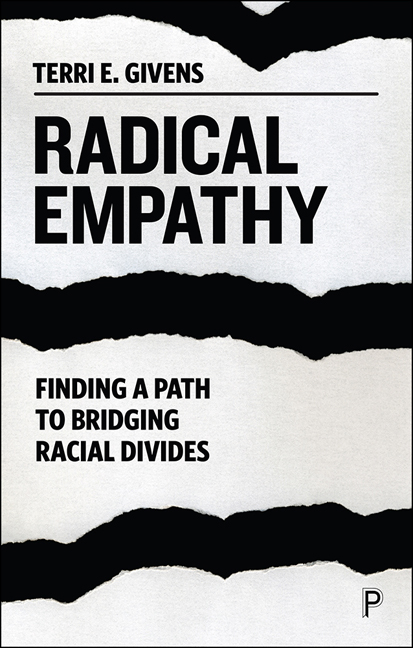Book contents
- Frontmatter
- Dedication
- Contents
- Note on the author
- Prologue:Writing in a time of crisis
- 1 Bridging divides: From racism to empathy in the 21st century
- 2 Getting to radical empathy
- 3 My family’s story: The isolation of internalized oppression
- 4 Racism and health disparities
- 5 Finding empathy in the academy
- 6 Love and marriage
- 7 Radical empathy in leadership: Creating change
- 8 Creating change at the national level: Restorative justice and working off the past
- 9 Revisiting the path to radical empathy
- Epilogue: The long road ahead
- Notes
- Suggested reading
- Index
9 - Revisiting the path to radical empathy
Published online by Cambridge University Press: 05 January 2022
- Frontmatter
- Dedication
- Contents
- Note on the author
- Prologue:Writing in a time of crisis
- 1 Bridging divides: From racism to empathy in the 21st century
- 2 Getting to radical empathy
- 3 My family’s story: The isolation of internalized oppression
- 4 Racism and health disparities
- 5 Finding empathy in the academy
- 6 Love and marriage
- 7 Radical empathy in leadership: Creating change
- 8 Creating change at the national level: Restorative justice and working off the past
- 9 Revisiting the path to radical empathy
- Epilogue: The long road ahead
- Notes
- Suggested reading
- Index
Summary
We are living in a time when practicing empathy, taking action, and creating change and building trust are more important than ever. From Washington, DC, to London, from Berlin to Sydney, from Hong Kong to Johannesburg, people around the world are crying out for social justice. The global pandemic caused by the COVID-19 virus is impacting us all, as we must find ways to support each other through a crisis that is not only impacting our health, but has also been devastating to the world economy. When I started working on this book, I could not have imagined the challenges that would be facing the world, but it makes the focus on radical empathy more timely than ever.
I wrote this book for two reasons. The first was my desire to take a closer look at my life, how I had been raised, and how I had made my way down my own path to radical empathy. The second reason was to find a way to bridge the racial divides I have seen not only in the US, but also in my research in Europe. Throughout this book, I have used my stories to demonstrate how I have learned and practiced empathy, and also how I have worked to create change in my personal life and in the lives of those around me. I have also looked at how I benefitted from the support of others, and how their empathy had a positive impact on my life.
The examples I have presented in these chapters are also designed to help you tell your own story, but those stories serve several purposes. Perhaps the most important step towards radical empathy is the willingness to be vulnerable. I have done that throughout this book, sharing stories that are often painful, but that are illustrative of the ways that structural racism impacts even a successful Black woman.
It wasn't until after college and meeting my husband that I started to feel comfortable with the person I was becoming. I believe in life-long learning, so the process of becoming grounded in who you are never ends—but it is also important to acknowledge the external forces that impact how we develop as people. For example, internalized oppression is a result of the impact of White supremacy and structural racism around us in the United States.
- Type
- Chapter
- Information
- Radical EmpathyFinding a Path to Bridging Racial Divides, pp. 151 - 154Publisher: Bristol University PressPrint publication year: 2021



